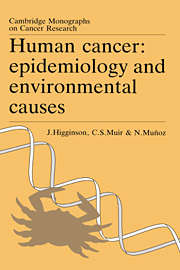Book contents
- Frontmatter
- Contents
- Contributors
- Preface
- Acknowledgements
- Historical introduction
- PART I Epidemiological methods
- PART II Causative factors in human cancer
- 6 The concept of cause: epidemiological considerations
- 7 Chemical factors
- 8 Occupational factors
- 9 Cultural factors: tobacco
- 10 Cultural factors: alcohol
- 11 Sexual behavior and reproductive factors
- 12 Nutritional factors
- 13 Physical factors: fiber carcinogenesis (including crystalline silicates)
- 14 Physical factors: implants and thermal chronic injury
- 15 Physical factors: ultraviolet (UV) light
- 16 Ionizing radiation
- 17 Biological causes
- 18 Genetic and other host-risk factors
- 19 Socio-economic factors
- PART III Legal and ethical considerations
- PART IV Introduction: total and specific site epidemiology
- PART V Buccal cavity
- PART VI Digestive system
- PART VII Respiratory system
- PART VIII Bone and soft tissue
- PART IX Skin
- PART X Breast and genitourinary system
- PART XI Eye and nervous system
- PART XII Thyroid and other endocrine glands, lymphoid and hematopoietic system
- PART XIII Cancers in children and multiple primary cancers
- Conclusions
- Appendix 1 Cancer statistics
- Appendix 2 A glossary of epidemiological terms
- Appendix 3 Acronyms and abbreviations
- Supplement
- Index
6 - The concept of cause: epidemiological considerations
Published online by Cambridge University Press: 03 May 2010
- Frontmatter
- Contents
- Contributors
- Preface
- Acknowledgements
- Historical introduction
- PART I Epidemiological methods
- PART II Causative factors in human cancer
- 6 The concept of cause: epidemiological considerations
- 7 Chemical factors
- 8 Occupational factors
- 9 Cultural factors: tobacco
- 10 Cultural factors: alcohol
- 11 Sexual behavior and reproductive factors
- 12 Nutritional factors
- 13 Physical factors: fiber carcinogenesis (including crystalline silicates)
- 14 Physical factors: implants and thermal chronic injury
- 15 Physical factors: ultraviolet (UV) light
- 16 Ionizing radiation
- 17 Biological causes
- 18 Genetic and other host-risk factors
- 19 Socio-economic factors
- PART III Legal and ethical considerations
- PART IV Introduction: total and specific site epidemiology
- PART V Buccal cavity
- PART VI Digestive system
- PART VII Respiratory system
- PART VIII Bone and soft tissue
- PART IX Skin
- PART X Breast and genitourinary system
- PART XI Eye and nervous system
- PART XII Thyroid and other endocrine glands, lymphoid and hematopoietic system
- PART XIII Cancers in children and multiple primary cancers
- Conclusions
- Appendix 1 Cancer statistics
- Appendix 2 A glossary of epidemiological terms
- Appendix 3 Acronyms and abbreviations
- Supplement
- Index
Summary
Nature of carcinogenesis
Clinical cancer reflects the outcome of a multistage process involving a cascade of biochemical and biophysical events which involve the individual cell and its micro-environment (Weinstein et al., 1984; Cline, 1989; Sharp, 1989; Bohr et al., 1989; Weinberg, 1989). Such events include mutation, gene damage and repair, gene insertion, and gene activation and repression as well as epigenetic events such as membrane and receptor changes, and variations in the metabolic and immunologic status of the host. In general, the molecular nature of many such events is not known with certainty, nor whether they are sequential or irreversible. It is generally assumed that some events are limiting steps and are critical or necessary for cancer induction; others may be epiphenomena. Changes in certain oncogenes may be an essential mechanistic step in some tumors, in others they may have relevance as biomarkers of use in diagnosis and prediction. It is accepted that the whole process can be directly or indirectly triggered by one or more exogenous or endogenous, including genetic, factors. These cover a range of stimuli varying from defined complete carcinogens to multiple as yet poorly identified enhancing factors which modulate carcinogenesis. The statement in the IARC monographs that ‘cancer can be induced by a range of different mechanisms which cannot as yet be defined or accurately measured’ (IARC, 1982) probably still remains true for the majority of tumors.
- Type
- Chapter
- Information
- Human CancerEpidemiology and Environmental Causes, pp. 65 - 73Publisher: Cambridge University PressPrint publication year: 1992



